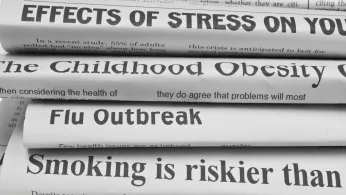16 results found

Press Releases
California kids: Drinking less soda but getting more calories from sugary sports and energy products
African-American and low-income kids are most at risk for health problems as the biggest consumers of sweetened beverages Children and teenagers in California are filling up on sports and energy drinks that contain similar amounts of sweeteners and pose the same health risks as soda, according to a new study by the UCLA Center for Health Policy Research.
May 23, 2018

Press Releases
California kids: Drinking less soda but getting more calories from sugary sports and energy products
African-American and low-income kids are most at risk for health problems as the biggest consumers of sweetened beverages Children and teenagers in California are filling up on sports and energy drinks that contain similar amounts of sweeteners and pose the same health risks as soda, according to a new study by the UCLA Center for Health Policy Research.
May 23, 2018

Press Releases
Nearly one-third of California children between the ages of 2 and 11 drink one or more sugary drinks per day, according to a UCLA fact sheet published today. That percentage represents an alarming increase since 2009, when just over one-quarter of the state’s children had one or more sugary drinks per day.
April 19, 2018

Press Releases
Nearly one-third of California children between the ages of 2 and 11 drink one or more sugary drinks per day, according to a UCLA fact sheet published today. That percentage represents an alarming increase since 2009, when just over one-quarter of the state’s children had one or more sugary drinks per day.
April 19, 2018

Press Releases
A new study released today offers hope that California may finally be getting a handle on its 30-year battle with childhood obesity, but it also showcases a patchwork of progress that leaves the majority of the state's counties still registering increases in obesity rates among school-age children.
November 09, 2011

Press Releases
A new study released today offers hope that California may finally be getting a handle on its 30-year battle with childhood obesity, but it also showcases a patchwork of progress that leaves the majority of the state's counties still registering increases in obesity rates among school-age children.
November 09, 2011

Press Releases
Despite living in the countryside, where open space is plentiful and there is often significant agricultural production, California's more than half a million rural elders are far more likely to be overweight or obese, physically inactive and food insecure than their suburban counterparts, according to a new policy brief from the UCLA Center for Health Policy Research.
June 14, 2011

Press Releases
Despite living in the countryside, where open space is plentiful and there is often significant agricultural production, California's more than half a million rural elders are far more likely to be overweight or obese, physically inactive and food insecure than their suburban counterparts, according to a new policy brief from the UCLA Center for Health Policy Research.
June 14, 2011

Press Releases
Health care reform. Immigrant health. Lesbian, gay and bisexual health data. Mental health. These and other urgent health and health policy issues are the subjects of 33 presentations at the 2010 American Public Health Association that feature Center researchers or data from the California Health Interview Survey (CHIS).
October 22, 2010

Press Releases
Health care reform. Immigrant health. Lesbian, gay and bisexual health data. Mental health. These and other urgent health and health policy issues are the subjects of 33 presentations at the 2010 American Public Health Association that feature Center researchers or data from the California Health Interview Survey (CHIS).
October 22, 2010

Press Releases
Although more than half are uninsured and receive less care when they need it, Mexican immigrant women have a lower prevalence of chronic diseases than U.S.-born women, according to a new report, Migration and Health: Mexican Immigrant Women in the United States. Yet high rates of obesity and diabetes, little physical activity and significant barriers to health care, among other factors, may make it difficult for Mexican immigrant women to maintain their comparatively good health in the future.
October 04, 2010

Press Releases
Although more than half are uninsured and receive less care when they need it, Mexican immigrant women have a lower prevalence of chronic diseases than U.S.-born women, according to a new report, Migration and Health: Mexican Immigrant Women in the United States. Yet high rates of obesity and diabetes, little physical activity and significant barriers to health care, among other factors, may make it difficult for Mexican immigrant women to maintain their comparatively good health in the future.
October 04, 2010

Press Releases
Although recent research has shown that obesity rates are leveling off among children generally, a new study published in the American Journal of Public Health finds that obesity prevalence significantly increased among lower-income California teens between 2001 and 2007.
September 30, 2010

Press Releases
Although recent research has shown that obesity rates are leveling off among children generally, a new study published in the American Journal of Public Health finds that obesity prevalence significantly increased among lower-income California teens between 2001 and 2007.
September 30, 2010

Press Releases
A majority of adults in California are obese or overweight, and more than 2 million have been diagnosed with diabetes, according to a new study from the UCLA Center for Health Policy Research. Both conditions — which are related to each other as well as to heart disease — increased significantly in just six years, with the prevalence of diabetes alone jumping nearly 26 percent between 2001 and 2007.
August 31, 2010

Press Releases
A majority of adults in California are obese or overweight, and more than 2 million have been diagnosed with diabetes, according to a new study from the UCLA Center for Health Policy Research. Both conditions — which are related to each other as well as to heart disease — increased significantly in just six years, with the prevalence of diabetes alone jumping nearly 26 percent between 2001 and 2007.
August 31, 2010

Press Releases
A new fact sheet from the UCLA Center for Health Policy Research provides a useful overview of some of the biggest health challenges for women in California, including high blood pressure, diabetes, smoking, overweight and obesity and cancer screening.
May 28, 2010

Press Releases
A new fact sheet from the UCLA Center for Health Policy Research provides a useful overview of some of the biggest health challenges for women in California, including high blood pressure, diabetes, smoking, overweight and obesity and cancer screening.
May 28, 2010

Press Releases
While health officials have long suspected the link between obesity and soda consumption, research released today provides the first scientific evidence of the potent role soda and other sugar-sweetened beverages play in fueling California’s expanding girth.
September 17, 2009

Press Releases
While health officials have long suspected the link between obesity and soda consumption, research released today provides the first scientific evidence of the potent role soda and other sugar-sweetened beverages play in fueling California’s expanding girth.
September 17, 2009




